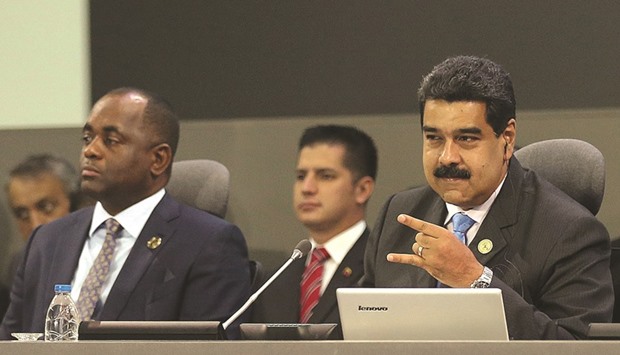The Non-Aligned Movement wrapped up a summit in Venezuela with an expression of support for its embattled host, President Nicolas Maduro, and scathing attacks on US “interventionism” around the world.
The 120-member group issued a statement at the end of the two-day meeting calling for peace, urging world powers not to meddle in other countries’ affairs and voicing concern over violence in Syria, Iraq and the Palestinian Territories.
The 190-page document also urges support for “the struggle against terrorism, for solidarity with refugees in northern Africa, and the Venezuelan people’s right to peace,”
Maduro told a press conference.
Maduro, who accuses the US of backing opposition attempts to remove him in a “coup,” emphasised that the summit had backed his government’s condemnation of US sanctions that declare Venezuela a threat to US national security. “It’s a total economic war; we will be winning it,” Maduro insisted at the closing event.
The White House says that language is a formality for imposing targeted sanctions, but Maduro has lambasted it as alarmist.
Venezuela took over the rotating presidency of the Non-Aligned Movement from Iran at the meeting. It will hold it for the next three years.
Maduro looks keen to recast the group as a bulwark against “interventionism” and “neo-colonialism,” analysts say.
Both words were oft-invoked at the summit.
Syria had harsh condemnation for the US after a US-led coalition strike killed dozens of Syrian soldiers on Saturday. Syria’s UN ambassador, Bashar Jaafari, accused Washington of seeking the “failure” of a tattered US-Russian ceasefire deal that aims to halt a five-year war that has killed more than 300,000 people.
Finding common ground with other group members, he also lashed out at US sanctions on Syria as “economic terrorism.”
“My country is suffering a unilateral blockade similar to the ones imposed on Cuba, Venezuela and other countries, in flagrant violation of the UN charter,” he said.
One of Opec-member Venezuela’s top missions for the summit was to seek backing for its campaign to slash abundant global oil production in a bid to raise prices.
Maduro said Opec and non-Opec countries are now “close” to a deal, adding he had discussed the issue with his Iranian and Ecuadoran counterparts. He did not give details, but said he hoped to have an announcement by the end of September on a plan to “stabilise the market” and adopt a “new methodology” to control prices.
Political analysts said Maduro was keen to use the summit to show Venezuela remains a player on the world stage.
The crisis is the biggest threat yet to Maduro and the socialist “revolution” launched in 1999 by his late predecessor, Hugo Chavez.
“Maduro is seeking to create the false impression that Venezuela still has international support and remains an influential actor. But it hasn’t been since Hugo Chavez died and oil prices fell,” said Diego Moya-Ocampos of London-based consultancy IHS Markit.
Margarita island has seen anti-government protests recently, but the government’s deployment of 14,000 police and soldiers for the summit ensured there were no major demonstrations.
Instead, hundreds of red-clad Maduro supporters marched to the convention centre where the summit was held, gathering at a newly unveiled statue of Chavez, for whom the building is named.
In a more clandestine display, Maduro opponents banged empty pots from their windows at night, a traditional form of protest in much of Latin America.

Venezuelan President Nicolas Maduro speaks during the closing ceremony of the Non-Aligned Movement summit in Porlamar, Margarita Island, Venezuela.
